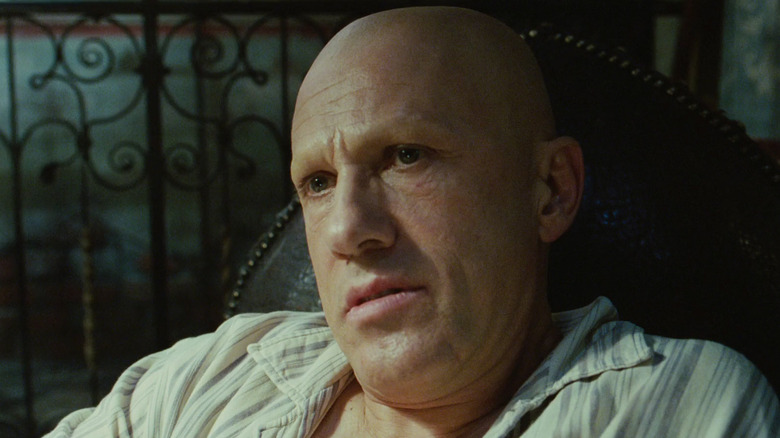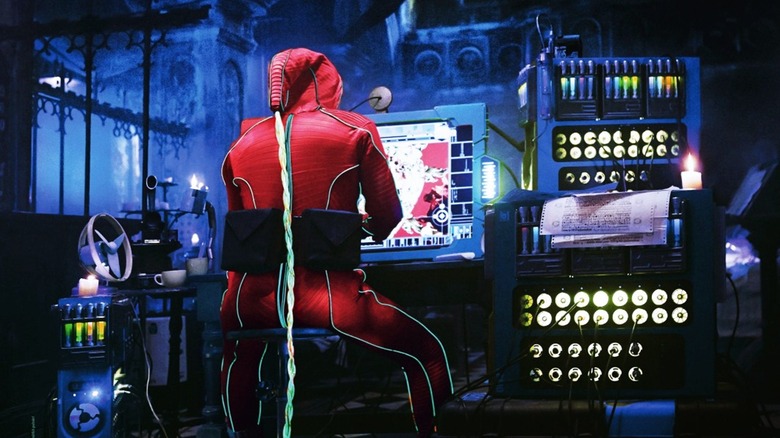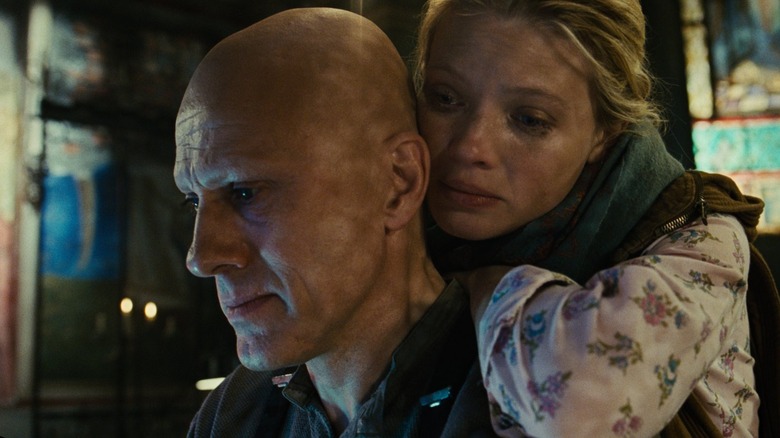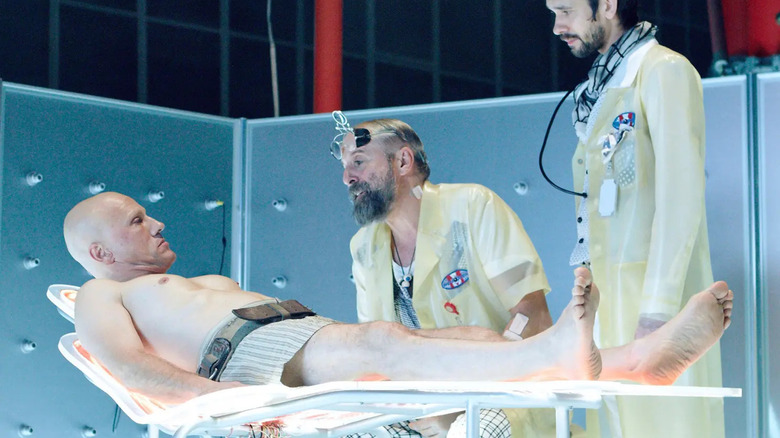The Zero Theorem's Original Ending Wasn't Enough For Terry Gilliam And Christoph Waltz
This post contains spoilers for the film "The Zero Theorem."
Terry Gilliam's 2014 film "The Zero Theorem" takes place in a near future that is overwhelmed by corporate control and personal chaos. At the center of the film is a mysterious company called Mancom, which is large and complex enough to have a division of ontology. Working for Mancom is a mentally unstable computer programmer named Qohen (Christoph Waltz), who spends his days "crunching entities" for ineffable purposes. His work in envisioned by screens filled with interlocking cubes. At night, Qohen sleeps in a dark, disused church, one of the only places he's content. A rarity in the universe of the film, Qohen is a man of faith. For therapy, he consults a psychiatrist robot called Dr. Shrink-Rom (Tilda Swinton).
Eventually, Qohen will learn that his ultimate goal at work is to author a massively complex mathematical proof declaring that everything in the universe adds up to zero. The Zero Theorem is like the pessimistic version of the Unified Field Theory. His job is miserable, and he holds out hope that he will one day receive a phone call to save him from his meaningless existence. That he never receives the call is likely Gilliam's own comment on both corporations and religion. Gilliam is himself a confirmed atheist.
"The Zero Theorem" ends with an abstract flourish. Qohen is told by Management (Matt Damon) that his life has no meaning and that he is fired. Qohen, in retribution, destroys his computer, causing a black hole — likely a hallucination — to open in front of him. He steps through the aperture and finds himself in "Heaven" having a picnic on a beach with his would-be true love Bainsley (Mélanie Thierry). The film's original conclusion, however, went in a different direction.
The original ending
One might easily see a lot of parallels between "The Zero Theorem" and Gilliam's celebrated 1985 film "Brazil," including a future world overrun by labyrinthine corporate bureaucracy. Both films are about human beings being fed into companies' Moloch-like jaws. The two films also share an interesting detail: they both contain Gilliam-contested endings. "Brazil" was infamously recut multiple times, with Gilliam's "bummer" ending once replaced by what is now called the "Love Conquers All" conclusion. The wrinkle this time is that the original ending for "Zero" was the "happy" version, and both Gilliam and Waltz felt that a new, "sad" ending would fit the picture better.
In a 2014 interview with Under the Radar, Gilliam talked about what the original ending was supposed to be and how he and Waltz came to change it. The original ending was to feature a fast sports car, an act of cathartic violence, and a note of hope. Gilliam resented that, even if the original ending was clearly what the film's studio backers preferred. He described the original ending as follows:
"And the ending — which was probably one of the reasons it got financed, because it was a good, happy ending — I said, okay, we'll do it. We went and shot it, and did it as well as we could. We had this fantastic Jaguar Roadster — a lot of good-looking stuff — and a couple big scenes on the streets. Somehow, Bob [a character played by Lucas Hedges] stole his father's car and arrived [at Qohen's home]. Qohen got in. Qohen burned down his chapel, and they rode off with fire engine sirens blazing everywhere. They were going to search for Bainsley on one of the islands."
Qohen is too damaged
Gilliam was uncomfortable with this ending because he felt that Qohen's ordeal was too intense for him to survive undamaged. It wasn't until he had put together the original ending that Gilliam saw it needed to be changed. Waltz, it seemed, agreed with him. Qohen didn't need a final moment of punk rebellion — however cathartic that might have been — but a brief moment of comfort in a dying world. Gilliam had constructed the film's future as one devoid of hope. Burning down a church wouldn't restore anything. Ambivalence was preferred. As Gilliam put it:
"I said, 'That's just crap. It doesn't work.' What was important was after the hammering we put Qohen through — there's a girl who wants to go away with him but he can't, because he's too damaged; there's a boy he can be father-like to, he can help, and that gets taken away from him; everything is taken away from this man. I felt we had to end on a note [where] he has dignity, and you felt that he has some acceptance of the world, rather than fighting, complaining, or running from it."
The dignity required that Qohen have a moment of strength. After struggling with "entities" and losing his way in a vast corporate machine — a machine that wants him to mathematically prove that nihilism is the only viable philosophy — Gilliam wanted his lead character to stand up and look content:
"It's there, and he's got control of something: the sun, and its setting. It's a virtual sun, but it's something. So, I decided to leave it at a moment where I think it was ambiguous, ambivalent, and Qohen looked tall, looked strong. In the other ending, he looked more like a fool."
What the screenwriter thought
Gilliam, as so often happens, argued with the movie's producers over the ending. Mercifully, however, the producers acquiesced, and Gilliam was allowed to craft his own ending. Gilliam said that his version was certainly a sad story, but also honest and fair. He knew that Qohen would vanish into a virtual world, knowing that humans have a propensity to flee into comforting fictions.
There was, of course, one last level of approval that Gilliam needed to look into. Pat Rushin wrote the original screenplay for "Zero," and it was his original ending that was abandoned. Luckily for everyone, Rushin hated his original ending as well. According to Gilliam, Rushin had felt pressured to include a traditional "Hollywood" ending, which was against the writer's better instincts. Everyone, its seemed, wanted the "bummer" ending this time. It was the opposite of Gilliam's experience on "Brazil." The director was pleased with the reaction, saying:
"The nice thing is when Pat Rushin saw the film, he thanked me for it. He said it was a crap ending we had on there before. But writers do these things ... under pressure, in the beginnings of films when you're trying to find money and interest, they try to make the thing safer for the investors. And there is no safety in film investment, but people like to believe there is; it you can put a nice, happy ending on there that Hollywood will be comfortable with, that's safer. That just isn't true at all."
Since "The Zero Theorem," Gilliam finally finished his very-long-in-production film "The Man Who Killed Don Quixote." It was released in 2018.



